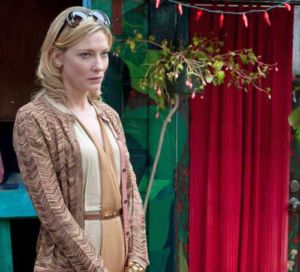Ew. Just ew.
One of the problems Woody Allen faces when he is trying to defend himself against charges of pedophilia is how often the male protagonists in his films, usually well into middle age, pursue and win the affections of much, much younger women. Most notoriously, he cast himself, at age 42, as a man dating 17-year-old Mariel Hemingway in 1979’s Manhattan; this year, he revealed this story was based on his relationship with a high school student he met on the set of Annie Hall. In 1991, Allen left his longtime girlfriend Mia Farrow for her 19-year-old adopted daughter, Soon-yi Previn, who Allen has been married to since 1997. Dating women just above the age of consent is not pedophilia, of course, just very often icky, but Allen also been accused of molesting his and Farrow’s daughter Dylan when she was seven. Allen vehemently denied the charges, but that scandal was omnipresent in the early 1990s, even after the police decided they did not believe Dylan and a judge found the charges inconclusive. However, the charges reappeared last winter, when Dylan, now named Malone and an adult, repeated them in detail to Vanity Fair and then in an open letter in The New York Times. This set loose a deluge of blog posts, tweets, and status updates taking either Malone or Allen’s side, with everyone claiming to know a truth that time and emotion have made impossible to determine.
Rarely does Woody Allen use his films to comment on politics, let alone on his personal life. Neither his break up with Mia Farrow nor his relationships with Soon-yi seem to have been fictionalized in any concrete way. He often focuses on issues of love, shame, class, and beauty, but finding the connections in Allen’s plots and character to his actual life has been folly. That said, in his latest film, the slight romantic comedy Magic in the Moonlight, the connection and the commentary seem rather clear, making obligatory romance between the middle-aged man and much younger women much ickier than ever.
In the 1920s, Colin Firth plays Stanley, a stiff British rationalist who does not suffer fools gladly yet happily makes money fooling them as a stage magician named Wei Ling Soo. After a show one night in Berlin, an old friend and fellow magician named Simon (Simon McBurney) visits and asks Stanley if he’d be willing to come to the French Riviera and help unmask a woman pretending to be a psychic whose act is particularly skillful. Exposing fakers is one of Stanley’s favorite hobbies and his Aunt Vanessa (Eileen Atkins) lives nearby, so he agrees. Upon meeting Sophie (Emma Stone), the mystic in question, Stanley pokes and prods the beautiful, young American, but he is increasingly unnerved as she seems to be able to read his mind and know things only a psychic could. Within days, he is as taken in by her as the rich family she and her mother is staying with who has been hanging on her every word. The son Brice (Hamish Linklater) is in love with Sophie, who is coyly weighing his marriage proposal. But now Stanley is in love with her, too.
The film is, as all of Allen’s are, full of dialogue as witty, wise, and funny as the best written in English, and it is directed with the bounce and effervescence expected of his light comedies. Firth, who rarely plays anyone other than a witty fuddy-duddy does this particularly wonderfully, and Stone, the only young American actress who can compete with Jennifer Lawrence in a charm contest, is also delightful. They are cute together, but Firth is more than twice Stone’s age, and when they kiss, it’s truly creepy. But it is not as creepy as the connection between the plot and Allen’s life. Stanley is determined to expose the lie of a very young woman, a lie central to her and her mother’s survival. The lie, and the desire to expose and be taken in by it, seems to me to represent Malone’s claim of abuse and the ease by which people believed it. By the end of the film, Allen makes a pretty clear statement about magical thinking, but the resolution is not comforting for those discomfited by Allen’s predilections.
Magic in the Moonlight
Written and Directed by Woody Allen
Starring Colin Firth, Emma Stone, and Eileen Atkins
Rated PG-13

